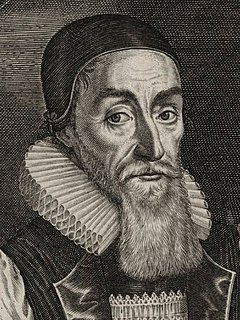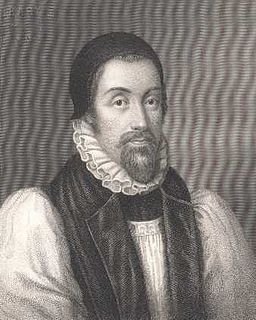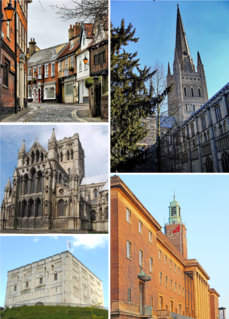
Lancelot Andrewes was an English bishop and scholar, who held high positions in the Church of England during the reigns of Elizabeth I and James I. During the latter's reign, Andrewes served successively as Bishop of Chichester, of Ely, and of Winchester and oversaw the translation of the King James Version of the Bible. In the Church of England he is commemorated on 25 September with a Lesser Festival.

Joseph Hall was an English bishop, satirist and moralist. His contemporaries knew him as a devotional writer, and a high-profile controversialist of the early 1640s. In church politics, he tended in fact to a middle way.

Thomas Morton was an English churchman, bishop of several dioceses. Well-connected and in favour with James I, he was also a significant polemical writer against Roman Catholic views. He rose to become Bishop of Durham, but despite a record of sympathetic treatment of Puritans as a diocesan, and underlying Calvinist beliefs shown in the Gagg controversy, his royalism saw him descend into poverty under the Commonwealth.

Samuel Harsnett, born Samuel Halsnoth, was an English writer on religion and Archbishop of York from 1629.

Tobias Matthew, was an English nobleman and bishop who was President of St John's College, Oxford from 1572 to 1576, before being appointed Vice-Chancellor of Oxford University from 1579 to 1583, and Matthew would then become Dean of Durham from 1583 to 1595. All three positions, plus others, were appointed to Matthew by Elizabeth I. Eventually, he was appointed Archbishop of York in 1606 by Elizabeth's successor, James I.

Matthew Hutton (1529–1606) was archbishop of York from 1595 to 1606.
Robert Browne was the founder of the Brownists, a common designation for early Separatists from the Church of England before 1620. In later life he was reconciled to the established church and became an Anglican priest.

John Overall (1559–1619) was the 38th bishop of the see of Norwich from 1618 until his death one year later. He had previously served as Bishop of Coventry and Lichfield, as Dean of St Paul's Cathedral from 1601, as Master of Catharine Hall from 1598, and as Regius Professor of Divinity at Cambridge University from 1596. He also served on the Court of High Commission and as a Translator of the King James Version of the Bible.

Henry Smith was an English clergyman, widely regarded as "the most popular Puritan preacher of Elizabethan London." His sermons at St. Clement Danes drew enormous crowds, and earned him a reputation as "Silver Tongued" Smith. The collected editions of his sermons, and especially his tract, "God's Arrow Against Atheists" were among the most frequently reprinted religious writings of the Elizabethan age.
Richard Cosin was an English jurist. He became prominent as an ecclesiastical lawyer in the service of Archbishop John Whitgift, active against the Puritans in the Church of England.
Francis Marbury (1555–1611) was a Cambridge-educated English cleric, schoolmaster and playwright. He is best known for being the father of Anne Hutchinson, considered the most famous English woman in colonial America, and Katherine Marbury Scott, the first known woman to convert to Quakerism in the United States.
Thomas White (c.1550–1624) was an English clergyman, founder of Sion College, London, and of White's professorship of moral philosophy at the University of Oxford. Thomas Fuller in Worthies of England acquits him of being a pluralist or usurer; he made a number of other bequests, and was noted in his lifetime for charitable gifts.
William Greenhill (1591–1671) was an English nonconformist clergyman, independent minister, and member of the Westminster Assembly.
John Stockwood was an English clergyman, preacher, translator of Protestant texts and school-master.
Richard Greenham (1535?–1594?) was an English clergyman of Puritan views, well known for his strong Puritan doctrine of the Sabbath. His many sermons and theological treatises had a significant influence on the Puritan movement in England.
John Frewen (1558–1628) was an English Puritan divine.
Thomas Rogers was an English Anglican clergyman, known as a theologian, controversialist and translator.
Oliver Pigg was an English Puritan clergyman.
Erasmus Webb B.D. was a Canon of Windsor, England from 1590 to 1614














